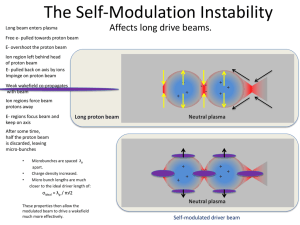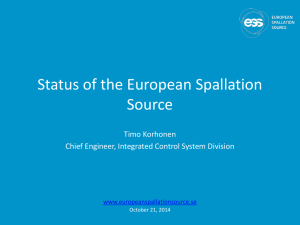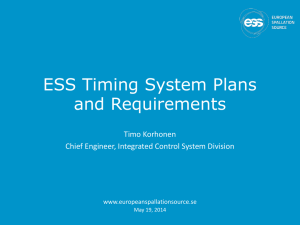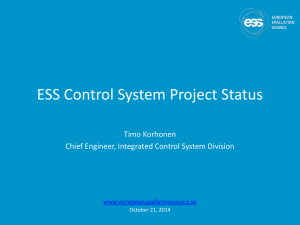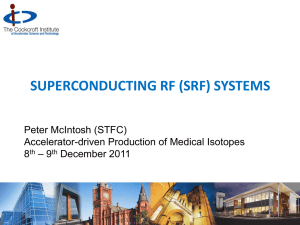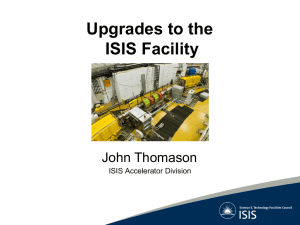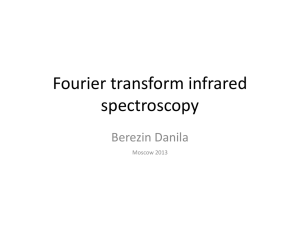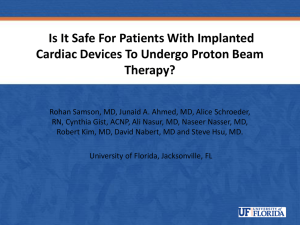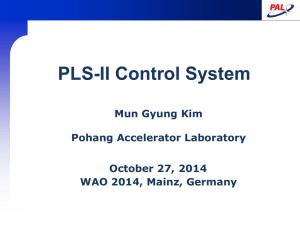Presentation
advertisement
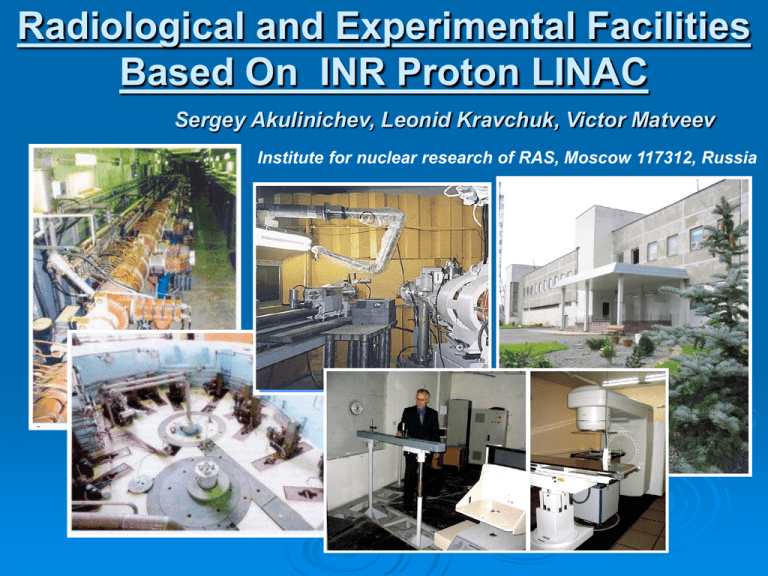
Radiological and Experimental Facilities Based On INR Proton LINAC Sergey Akulinichev, Leonid Kravchuk, Victor Matveev Institute for nuclear research of RAS, Moscow 117312, Russia Facilities at the Linac and the Experimental Complex of INR Isotope production Proton linac The H+, H- linac H+ TWD to Exp.Hall Isotope production facility at 160 MeV proton beam RFQ H- Linac TWD High intensity neutron sources: RADEX and INS Proton and neutron therapy facilities Experimental Hall from linac MDDESD BM RADEX INS Proton Therapy NS (INS) The INR Linac Proton Beam Parameters Beam energy 140 - 600 MeV (450 MeV) Beam current 0.1 nA - 0.5 mA ( 0.1 mA ) Beam pulse duration (TWD) 0.25 - 180 mks Pulse frequency 1 - 100 Hz (50 Hz) The Isotope Production Facility Proton Beam Parameters. Beam energy 160 MeV. Beam current up to 0.5 mA ( 0.1 mA ). Beam pulse duration 60 - 180 mks. Pulse frequency 1 - 100 Hz. Isotope production (Pd 103, Sr 82-Rb, Cu 67, Sn 117 and others). Beam Microstructure The traveling wave deflectors operate at the 400 keV injector beam line. Beam Injector Can form the necessary beam shape inside the macro-impulse (180 µs) of the beam with the 10-20 ns front times. The deflecting field is 3-5 kV. Is involved in the Safety system of the INR linac. Is used to adjust the needed beam frequency 0-100 Hz. Is used as a beam dump. Beam TWD 180 mks Tg MDD field Beam RADEX Beam Spectrometer Time diagram of deflector operation RADEX Impulse Neutron Source for Material Science. Target W+Н2O ( 32 40 cm) creates the neutron flow to horizontal and vertical channels. Beam pulse duration 0.25-180 mks. Beam frequency 1-100 Hz. Neutron intensity 2·1015 n/s ( < 15 MeV ), ~1.5·1014 n/s (15 – 300 MeV ). Neutron spectra has an evaporation form with about 9% of cascade neutrons. Impulse Neutron Source Neutron intensity ~1016 n/s 7 channels with 204 mm and 10 m length Beam pulse duration 0.25-180 mks Beam frequency 1-100 Hz Neutron energy ~ 0.025 20·106 eV TOF Spectrometer (Pb cube, C prism ) Neutron energy 1 eV - 30 keV. Neutron intensity ~106 n/cm2/s near the cube surface with ~1 mkA proton beam current Beam pulse duration 0.25-180 mks Facilities for Particle Therapy in Russia Since facilities for particle therapy are quite complicated and expensive, most of working hadrontherapy centers are still based on physical research institutes. Also it helps to coordinate efforts of medical and physical scientists. Institute Beam energy, MeV Beam pulse, mks Pulse frequency, Hz Patients treated ITEP, Moscow 70-200 0,14 <1 3500 PINP, St.Peter. 1000 300 40 1200 JINR, Dubna 660 30 250 200 INR, Troitsk 74-247 0,2-180 50-100 - 50 In Russia only the accelerator in Troitsk fits all basic requirements of proton therapy for beam parameters (the energy range, duration and frequency of pulses). Radiological Facilities at INR Proton therapy: The proton linac (energy 74 – 247 MeV, beam current 1 nA-1mkA). Medical isotope production at the INR linac (Pd 103, Sr 82-Rb, Cu 67, Sn 117 and others). Neutron therapy: High intensity neutron sources (~109 n/cm2/s). Photon therapy: The electron linear accelerator SL-75-5-МТ (energy up to 6 MeV). The Medical Electron Linear Accelerator SL-75-5-МТ The maximal energy of photons – 6 МV. The maximal doze in the isocenter – 5 Gray/min. Irradiation field in the isocenter – 40x40 cm. Capacity- up to 50 patients per day. The boost method (γ+p) will allow to increase the overall performance of the proton linac. Unique Devices and Systems for Radiotherapy at INR Unique devices and systems for radiotherapy were designed and created in INR: Universal and very precise (10 mkm at 40x40x30 cm) computer-driven treatment chair for the fixation of patient in any position, Unique for their transparency and sensitivity narrow-gap (~2mm) air ionization chambers of radialoriented polyimide films, The digital x-ray patient centration system . Ambulatory of INR Radiological Centre Capacity: 50 patients per day. Personnel: 15-20. The indoor area: 550 м2. Supply systems: System of independent water purification, System of independent power supply, Central air conditioning. The X-ray laboratory for topometry and therapy is under construction. Perspectives of the Radiological Centre Projected 2-nd stage of the Radiological center will have: an additional treatment room with vertical and horizontal beams of protons, laboratory for diagnostics and therapy with radionuclides Full circle of the isotope production Treatment room for neutron capturing therapy Together with the Hospital of RAS, the Medical Complex in Troitsk will be one of the biggest radiological centres in Russia. Perspectives of the Radiological Centre Concluding, The INR Radiological centre may become an universal radiological centre, where most modern methods of radiology and radiobiology will be developed and applied. The linac properties (the possibility to vary the energy and the intensity of beams in a wide range) provide as the proton therapy, as also other main methods of radiology: brachytherapy, diagnostics and therapy with radiopharmaceuticals and the neutron - capture therapy. As a part of the Medical Complex in Troitsk it will be one of the biggest radiological centers in Russia. Based on possibilities of physical research Institute and the Hospital, it will be a place there medical and physical scientists can work together. The possibility of the simultaneous operation of isotope production facility, installations of experimental hall and proton treatment increases considerably the economical effectiveness of linac operation.
